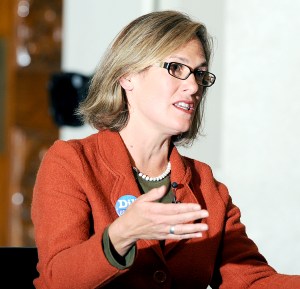LEWISTON — The top rivals hoping to win the seat of U.S. Sen. Olympia Snowe, R-Maine, squared off in a three-way debate at the Franco-American Center on Monday evening.
Before a live audience of about 300 people and about 350 online, Republican Charlie Summers, independent Angus King and Democrat Cynthia Dill fielded nearly 90 minutes worth of questions.
They touched on a range of topics, including health care, the economy, energy and war. They also defended their campaigns and their positions on key issues, including why they felt they were the best choice to replace Snowe, who is retiring after three terms in the U.S. Senate.
From gun control to how special education is funded to whether the Federal Reserve is pursuing the right monetary policies, the candidates agreed, disagreed and essentially agreed to disagree.
Each played to their strengths, Summers pitching his experience as a veteran of the wars in Iraq and Afghanistan, Dill to her lifelong commitment to progressive values and King to the things he accomplished during his eight years as Maine’s top executive.
King pitched his independence and focused on trying to be a politician who would do things differently than the status quo of the two-party system.
“The system isn’t working,” King said. “All of you know this, it’s the worse we’ve ever seen in our lifetimes and one of my life principles is if something is not working, then doing the same thing harder isn’t going to give you a different result.”
Summers said he didn’t believe the government in the U.S. was broken, only without leadership.
“The system is not broken,” Summers said. “It is rudderless, it is without leadership.” He again challenged King’s record on the state budget during King’s time in office and reiterated the biggest issue facing the country was the federal budget deficit.
“The problem that this country faces in terms of its debt and in terms of its spending is one that will be the preeminent issue that faces the next United States senator,” Summers said.
Dill said neither Summers or King had it right. “You’ve got one candidate who says the system is broken. But let’s face it, it is broke, but it’s not broke for guys like him. It’s broke for the rest of us,” Dill said.
“You have another candidate who says the problems are debt and deficit, and yet his response is let’s lower tax rates some more, expand our military presence around the world and then give tax deductions for health care premiums. Do the math all of you,” she said.
Dill said she was the only candidate in the race standing up for working families and small businesses.
King and Summers both begged to differ.
Dill and King agreed they would support the Affordable Care Act, otherwise known as “Obamacare” that was recently upheld by the U.S. Supreme Court, while Summers said he would work to repeal it.
The candidates also offered vastly differing views on gun control, the Federal Reserve and another U.S. Supreme Court decision that allows for anonymous donations to political “super PACS.”
King has been the target of multiple television attack ads financed by these organizations. Dill has also had ads produced on her behalf, but without her support or permission.
Summers reiterated his position that those organizations were practicing their rights to free speech while King and Dill both bashed the practice. Dill said a constitutional amendment was not beyond the realm of possibilities when it came to fixing the problem.
King then pointed out a person in the audience who he said was paid by the Republican National Senatorial Committee to follow him around.
“He goes everywhere I go and I assume he wants to get a picture of me slugging a baby,” King said. He said the person, who King identified only as “Zach,” was following his campaign and taking pictures every place King went.
“I’ve got to tell you I think it’s pretty lousy that we’ve sunk to that level of negativity in our campaigns,” King said. He noted $1.3 million in negative advertising had been spent against him.
The candidates did agree on several areas. All said they would not favor putting combat troops in Syria and that they do not support a preemptive U.S. military strike against Iran.
The candidates also seemed to agree on the federal No Child Left Behind Act, saying federal education standards that were not sustained with federal funds were unfair and that education standards should be handled at the state and federal level.
Sponsors for the debate include the Franco-American Heritage Center, the Young Professionals of the Lewiston-Auburn Area, the Sun Journal and the law firm of Skelton, Taintor & Abbott.
In his opening statements, Summers spoke with concern about his youngest son, Thomas.
“I wonder whether or not he will have the same opportunities that I had, will he have the same opportunity to move forward to know that if you work hard and you apply yourself in this world, then you will actually be successful and move forward in this world,” Summers said. “I think those are the great questions that are facing us.”
Dill said she got in the race early and emphasized it was before Snowe announced her retirement. “I agree that government in Washington is broken but I would submit it is broken for most of us, but it works very well for a very small class of people, of which some of my opponents belong.”
King said Snowe’s retirement message prompted him to get back into politics.
“I wouldn’t have chosen this, or predicted it 10 years ago,” King said. “But sometimes an opportunity or a situation or a challenge arises that you simply can’t walk away from.”
Live Chat during the debate:
Fact check on candidate statements
By Matthew Stone, Robert Long, Susan Young and William P. Davis, BDN Staff
During Monday’s U.S. Senate debate in Lewiston, Bangor Daily News staffers looked into some of the statements and claims made by the candidates — state Sen. Cynthia Dill, a Democrat; Angus King, a two-term independent governor; and Charlie Summers, the Republican candidate and Maine’s secretary of state. Here is what we found.
Cynthia Dill
In her opening remarks, Dill said Maine has the highest level of seniors with food insecurity. AARP says Maine ranks 17th for seniors ’ risk of hunger. Meals on Wheels puts Maine at 17th as well, but its data is a bit dated.
Dill said DHHS has been dysfunctional since Paul LePage took over as governor, but most of the problems the LePage administration has encountered are a result of problems withcomputers systems, which were implemented or decided on years before LePage took office.
Dill said 97 percent of businesses in Maine are small businesses. According to the U.S. Small Business Association, in 2008, small businesses do in fact make up 97.2 percent of the state’s employers and account for 59.7 percent of the state’s private-sector jobs. Of the 147,484 businesses in Maine, only 33,962 are employers. The SBA considers any company with fewer than 500 employees to be a small business.
Angus King
King said Maine has the second-highest gun ownership rate in the country and one of the lowest gun crime rates. It’s hard to find hard statistics on gun ownership rates, but the numbers we found puts Maine in the middle — about 40 percent of Mainers own guns, according to a 2001 survey, as opposed to nearly 60 percent of people in Wyoming and about 12 percent in Rhode Island, Massachusetts and New Jersey. Hawaii has the lowest gun ownership rate, at 8.7 percent.
Regarding King’s statement that Maine has one of the lowest gun crime rates, it’s hard to get reliable statistics on that because of the relatively low number of homicides in Maine. The statistics we have show that about half of Maine’s homicides are gun-related and that Maine does indeed haveone of the lowest gun homicide rates in the country.
King mentioned students graduating college with more than $100,000 in loan debt. The national average student debt is $25,250. In Maine, students graduate with an average of $29,983 in debt. That’s the second-highest debt load in the country, but far below $100,000, which King seemed to imply was normal.
King said that Bath Iron Works was the largest employer in Lewiston. Central Maine Medical Center and St. Mary’s Health Systems are the largest nongovernmental employers in Lewiston-Auburn, according to the Lewiston-Auburn Economic Growth Council. What is unclear is how many Lewiston residents commute to BIW for work.
King attributed this quote to Mark Twain: “History does not repeat itself, but it does rhyme.” While this quote is commonly attributed to Twain, scholars have been unable to find a record attributing this quote to him.
Charlie Summers
In responding to a question about job creation and unemployment, Summers said the nation’s regulatory burden amounted to a $1.7 trillion tax. He was citing a Small Business Administration study released in Sept. 2010. The study found the annual cost of regulations had grown to $1.75 trillion annually by 2008. Small businesses, the study found, shouldered the largest portion of this burden.
Summers twice asserted that the Affordable Care Act, commonly known as Obamacare, would cost the nation $2 trillion. That number is at best inflated — the nonpartisan Congressional Budget Office stated in March, “the insurance coverage provisions of the ACA will have a net cost of just under $1.1 trillion over the 2012-2021 period” but stated that those numbers do not take into account money-saving provisions in the law. “CBO and [Congress’ Joint Committee on Taxation] have previously estimated that the ACA will, on net, reduce budget deficits over the 2012-2021 period,” according to the same release.
Summers, on capital gains, said people have already paid taxes on that money when they invested it. This is not true. Capital gains is the money earned on an investment — the money that is taxed is the money that is earned, not the money that is invested.
Summers said there are “literally tens of thousands of gun laws” on the books. A Brookings reportsays that number is inflated. The number is 300 major state and federal laws as of 2002. More than 9,700 would have had to pass in the last decade in order to make that true.
In his closing statement, Summers said King, as governor, took a $300 million surplus and turned it into a $1 billion deficit. The MaineToday papers have rated these numbers true. The term deficit, however, is inaccurate. Maine’s constitution requires a balanced budget. The $1 billion figure refers to a structural gap: Had the Legislature that took over as King left office in 2003 funded all services at the same level, the state would have spent about $1 billion more than it was projected to take in in revenue.





Comments are no longer available on this story